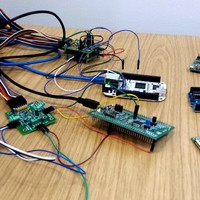Who ate my battery?
Why free and open source systems are solving the problem of excessive energy consumption.
- Track: Tracing and debugging
- Room: Janson
- Day: Saturday
- Start: 16:00
- End: 16:50

Despite a decade of innovative development, and despite improvements in battery technology, a modern smartphone needs recharging far more often than its turn-of-the-century predecessor. Yet the blame cannot be laid at the door of hardware engineers; the problem lies in the software. Fortunately free and open source technology is racing to the rescue. With this talk we aim to promote energy efficiency to a first class software design goal.
Modern silicon chips are able use very little power. Multiple clock domains, clock gating and dynamic voltage and frequency control have all served to make modern hardware highly energy efficient. Yet all that can be destroyed by the software running on the chip. In this presentation we will look at how the entire software design process needs reworking to bring the software engineering team into low power design from day one. Central to this is the availability of good software development tool support, debug functionality, and energy transparency from hardware to software. We will explain why developers should consider energy consumption as a primary design goal for software, give an insight into how energy consumption of code can be measured and present some of the tools we are currently working on to enable more energy efficient software development.
Open source is playing a central role in giving developers access to tools that enable energy efficient design. We will present details of MAGEEC, a UK government funded project to build the next generation of open source machine learning compilers, which will optimize for energy efficiency. We will present the compiler framework, and the energy measurement hardware, both of which are fully open source. We will also introduce the EU ENTRA project, which aims to promote energy aware system development by enabling energy transparency from the hardware to the software in a computer system. This will be achieved using advanced energy modelling and program analysis techniques to make predictions of energy usage available to the system developer and to the software engineering tool chain. We will present energy consumption analysis tools developed in the ENTRA project.
The talk leads into the Energy Efficient Computing devroom happening on Sunday.
Speakers
| Jeremy Bennett | |
| Kerstin Eder |